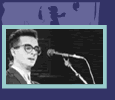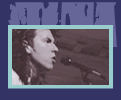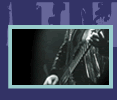|
A
BEACH TOO FAR
CACTUS
WORLD NEWS arrive back in Blighty this week after a coast-to-coast
trek across America. Barry McIIheney caught up with them in San
Francisco and heard how everyone from Joey Ramone to Lou Reed has
been getting in on the act.
Just
think about this for a minute. Four blokes from Dublin, one of them
completely bald, decide to get a wee band together to try out some
songs they've been knocking out together in a freezing flat over
the previous few months. One of these chaps wears serious school
swot glasses and the others one's hair flows sideways at an extraordinary
rate. They've already got the baldie so they ask this odd-looking
bass player who no one's ever heard of before to come in on the
bass and make it a four. They call themselves Cactus World News.
The
music they eventually produce relies heavily on the guitarist who
finishes off all the early shows by practically bonking his guitar
and then letting it hang in mid-air to produce loads of feedback.
It's some sort of rock`n`roll with twists in all the wrong places
but somehow or other they get signed to a major recording deal and
that's the last anyone ever expects to hear of them. By now, or
so the script goes, they should all be back in Dublin nursing their
pride and scouring the sits vac columns with a vengeance.
Funny
that. I ran into them in Los Angeles two weeks ago and they'd just
packed the Whiskey-A-Go-Go to the rafters twice over so I thought
this was a bit odd and I raced back to the hotel and couldn't get
them off the radio. So them I went to San Francisco with them and
they kept getting stopped in the streets for autographs and bumping
into T-Bone Burnett and Big Country at their shows. I went there
expecting a sob story and all I could smell was success.
These
shows on the West Coast are the culmination of a seven-week trek
that has seen Cactus World News play just about every hole in the
hedge on the American mainland. They've been interviewed by everyone
who has ever published a sixth-form essay and been played on every
radio station from here to New York City. It's all a long way from
Dublin, where the band are still regarded by many as Johnny-come-latelys,
or even London, where grown men who write for other music papers
stamp their feet with annoyance because the noise they hear doesn't
quite tally with the morris dancing so popular in their neck of
the (back) woods.
Hardly
surprising then that singer, Eoin McEvoy, guitarist Frank Kearns
and bassist Fergal MacAindris are so chuffed with their reception
in the big country.
"Certainly,
Americans just seem to be eternally enthusiastic about music,"
says Eoin, "and you would think, you know, they've seen it
all before, but their knowledge about new British bands just embarrasses
me. I was doing one radio interview in Boston and the deejay asked
me what I thought of the new Ruefrex album and it was like…
well, I can't say because I haven't got around to hearing it yet.
Embarrassing."
Fergal
MacAindris chooses this early moment to make his official debut
in print: "I've been on shows where people ring in and ask
for a song by, say, The Telephone Operators and they must be a new
band from New York and they turn out to be based in Bangor, North
Wales. And it's not just deejays, it's like the people who come
to the shows as well and you're talking to them after the show and
they're apologising for not really being too well up on music 'cos
they've only got 2,000 records in their collection!"
And
it's not just the deejays or the punters who appear to be so taken
by the latest Irish export to the States. Way back at the start
in New York, Joey Ramone dropped in backstage to pay his respects
and have a bit of a chat, causing lifelong Ramones fan Frank to
nearly pass out on the spot.
"It
was like a part of my youth just standing talking to me - and I
just couldn't really take it in. I thought at first that he wasn't
really listening to anything we were saying but then he would say
something from behind the shades and you'd realise that this guy
is totally on the case. He's just started doing some work for the
American music magazine Spin and he was walking around saying 'Well,
I'm a journalist now' and anyone listening to him would have thought
this guy's a bit thick but he's not, no way. I still can't believe
it happened and that he LIKES us. You start thinking why on earth
would the great Joey Ramone ever listen to anything I do, let alone
LIKE it."
Or
Lou Reed for that matter, Eoin.
"That
was another real heartstopper. I've got a friend in New York who
watches MTV 24 hours a day and he rang me to say Lou Reed had just
been on talking about us and he's taped it so I went around there
to watch Lou Reed introduce the 'Years Later' video and then say
a few kind words about how he really liked the band. We've probably
still got this inferiority complex but, like Frank said, how can
Lou Reed be saying these things about US?"
Because
you're never off the radio here, you're never out of the papers
("Punk Drummer Slams Pogues" being the best yet) and maybe,
perhaps, these people might even like you because you're actually
quite good. Certainly, this Cactus live model puts the old one to
shame, with a new-found confidence bred from such extensive touring
and a lot more room now for the songs to flourish instead of the
old one-dimensional charge right from the word go.
The
San Francisco show, in particular, demonstrated just how far they've
come from their last British performances, with a lot less rugged
plodding and a lot more genuine emotion and even humour about the
whole thing, leading to a stage invasion in 'Frisco and a near-coronary
next to me.
It
was this young bloke and it was during "Maybe This Time"
and it was the bit just before all hell breaks loose and Frank comes
romping in and this bloke, he started to roll his eyes and his arms
in a fit of glorious anticipation and then when it comes he just…
bursts himself open with joy and relief, screaming "fucking
splendid" into my vat of beer.
Something's
happened.
Eoin:
"I don't really know. It's hard for us to say because we're
closely involved with it all the time. I sometimes think it would
be nice to go into the crowd one night and see Cactus World News
play live and then I might have more of an idea. I know what you
mean about it being less cluttered and there being more light and
shade now which is something that's there on the album and which
we're finally trying to get live. I suppose it's a lot more…"
"Disciplined,"
interjects Fergal, "more disciplined due to the touring here.
There are maybe more gaps and that probably comes from a new confidence
and knowing that we don't have to be playing all the time now. Although,
we do still rely on our instincts a lot and, like in L.A., where
we did the two sets, a couple of numbers went off at a completely
different tangent to the first."
Ah
yes, the old eye-contact gamble. Even after six weeks on the road?
"Eoin:
"Well, it's very easy to slip into the same routine every night
but, ultimately, your audience will sense that and they'll know
you're not being honest with them. I think the one thing we try
to keep all the time is that impression of building up to something,
then releasing it, that light and shade."
Fergal:
"A lot of people, especially in English groups, seem to think
that it's very clever to build up an audience and then leave them
all tight and frustrated by not letting it out. Clever, but not
very enjoyable. We tend to take it all the way through, quite naturally.
It's almost medicinal."
Sounds
like my drinking, but this pop dynamic of taking you through the
early stages to the crushing denouement is what separates Cactus
from the darker side of the Goths to whom they are sometimes compared
and plants them more in the U2 (he said it, he said it) Alarm/Big
Country mould, if anywhere at all. In the States, however, the old
U2 chestnut appears to have died a death due to the simple passage
of time and the gradual realisation that here is a band with a character
all of its own.
"We
still get a bit of the U2 lark," admits Frank, "but only
in a very natural way in that people will always ask 'what was it
like to work with Bono'. There are other instances though where
people will actually turn quite protective towards us when U2 are
mentioned and will stress that this is Cactus World News, not U2
Mark II. I think it's great that we're not easily pigeonholed."
Maybe
that's not too surprising when your singer cites T-Bone Burnett
and Run DMC as particular faves in the same sentence, or when you
go on stage with the bass player in a cowboy hat, the singer in
a waistcoat, the guitarist in his inevitable necktie and the drummer
without his wig. Similarly, the inner sleeve of the Urban Beaches
album makes none of the usual attempts to portray the band as a
clean-cut unified image, with Frank actually snapped in a souwester
FISHING(rock`n`roll) and drummer Wayne looking every inch the heavy-duty
biker.
It's
Wayne in fact, currently off doing whatever it is that drummers
do before gigs, who perhaps lies at the very roof of the Cactus
live sound, driving the beast with a frightening intensity and glaring
at the others when the pace appears to be flagging for a second.
Frank and Fergal meanwhile, "unrepentant hairies" in Fricke's
memorable phrase, stand either side of McEvoy and turn it on, Frank
spring about all over the place and Fergal adopting the classic
Irish showband tradition of staring straight at the clock at the
back of the hall for the entire show. Girlies wet themselves at
this for some reason and I even bought him a breakfast to see if
it would rub off. And then there's Eoin McEvoy, the most unlikely
frontman since… well, for an awful long time. Small, desperately
skinny, clean-cut and wearing the faithful old Gregory Pecks. Young
ladies want to mother this boy, mothers want to educate him.
"There's
this one girl and her mother, who's a middle-aged woman and they've
been to see us about six or seven times already. And at the Philadelphia
show this time around, the mother gave me this brilliant dictionary,
which is basically a rhyming dictionary in that it gives you one
word and then about 500 that rhyme with it (don't even MENTION this
to Ted Mico) and inside the flap she'd written out the first two
lines of "Jigsaw Street", which go 'I looked in a dictionary
to try to find a word, but really there's no way to describe this
level of the absurd', and under that she wrote 'hope this is of
some use to you'. This middle-aged woman knows the songs really
internally, better than I do! I was moved by that."
The
Cacti people now plan to play one London show at the Camden Palace
this week before jetting off to Europe for a
four-week tour of Scandinavia, the Low Countries and all points
in between. They've also just released "The Bridge" single,
which would appear to be a bit of a backward step for a group at
this stage of their development. "The thing about The Bridge",
says Frank, "is that it was only ever released through Mother
Records in Ireland and they only made about 2,000 copies. And everywhere
we go now, we get people coming up and asking where they can get
it, so it's really frustrating for them and for us. It's hard to
describe how we feel about it, obviously we hope it's a success
but still on our own terms. It's not like there's any big pressure
on it to be a hit single NOW, because we've always said that we
are the sort of group who will gradually build up a following rather
than charging straight into the charts at number nine or whatever.
It was the same with the album which sold steadily but which will
probably only make sense to most people after the third album."
Good
Lord, the third album already, but then Cactus World News have never
been short on the old determination, pledging from the start that
this was going to be no six-month phenomenon. Eoin McEvoy, a very
tired man, still gets these funny dreams when he thinks back to
what he left behind in Ireland.
"I
had this total recall experience when I was in Arizona after a long
drive and a night of thunder and lightening. It was ridiculous because
I was dreaming about this guy in school who I didn't even know that
well and he was shouting at me about the number of strings I break
and I was shouting back at him and eventually I woke myself with
the sound of my own voice, really screaming and yelling. I think
now that maybe I was going a bit funny because I was starting to
forget where I was and what had happened the previous night and
it all became a bit of a blur. And all I could think of was this
woman I'd seen in New York and she was sitting in the business area,
respectably dressed and holding up a sign which described how she
had just had a calamity in her life and how she was suddenly out
on the street. And she had tears in her eyes and it could have been
you or me, and that is all I could remember about my time in New
York."
That
might not make much sense, but Eoin McEvoy tends to ramble on a
bit anyway and he doesn't really work like most people I know. A
few hours later he was walking down towards the concert near San
Francisco's Fisherman's Wharf area and some bloke who'd travelled
a long way to see him came over, shook hands and tried on his glasses.
"Shit,"
he said, "the world looks a different place from here."
The
world looks a different place from behind Eoin McEvoy's glasses.
Just think about that for a minute.
Barry
McIIheney - Melody Maker, September 20, 1986
BACK
TO ARCHIVE - PREVIOUS
|




